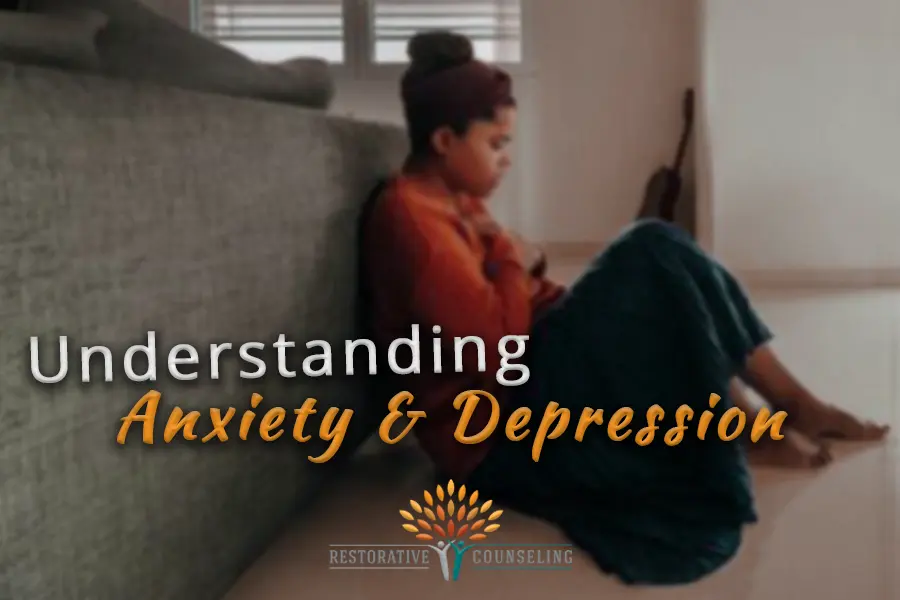Written by Jordan Meehan, LCSW
We all experience difficult emotions from time to time. So when should you seek help if these emotions start to feel overwhelming?
Everyone has felt outside of their emotional comfort zone at times. Like most people, you have likely faced feelings of anxiety, sadness, fear, anger, or irritability.
Maybe it has been difficult to put a word to the feeling at times. Big test coming up? Cue the stomach butterflies and sweaty palms. Lost your job? Nothing seems fun right now and you have no interest in being around others.
Throughout life, difficult experiences can cause a variety of different emotional states. Most of these are probably not the most enjoyable. What most people consider to be the “enjoyable” emotional states consist of feelings such as:
- Calm
- Happy
- Joyful
- Interested
- Thoughtful
- Peaceful
- Content
While people strive to feel these things as often as possible, the human brain and body don’t always operate according to this plan. Like all animals, humans are designed to survive, and the emotions that people experience assist with survival. These emotions act as signals to alert a person that a source of stress is present. When stress is present, people tend to feel things like anxiety, fear, sadness, nervousness, anger, disinterest, and fatigue.
Once the source of the stress is identified, there are a number of techniques for dealing with and eliminating feelings of depression and anxiety. In many cases, these distressing feelings go away, and the person returns to a more neutral emotional state.
Unfortunately, this does not always happen.
When to Seek Treatment for Anxiety or Depression
When anxiety or depression symptoms are experienced for a short time and do not linger once a source of stress is gone, this is an expected emotional reaction. To better assess when an emotional state may require professional treatment, the first step is to understand the symptoms of anxiety and depression.
Anxiety occurs as a result of the nervous system kicking into high gear as a response to a source of stress.
Some of the most common symptoms of anxiety include:
- Worry
- Racing thoughts
- Trouble focusing
- Feelings of dread
- Racing heart
- Avoidance
- Procrastination
- Difficulty sleeping
- Irritability towards others
While anxiety revs the body up, depression slows the body down. Depression is more than just feeling sad.
Depression symptoms include:
- Feeling down or blue
- Sense of hopelessness
- Loss of interest in hobbies
- Excessive tiredness and need to sleep
- Anger
- Appetite changes
- Trouble focusing
- Feelings of guilt or worthlessness
Feeling anxious or depressed is normal for any human at one time or another. If any of these symptoms occur for an extended period of time or do not improve once a source of stress is gone, it may be time to seek help.
Treatment for Anxiety and Depression
Have you tried to cope with anxiety and depression on your own without success? Then it might be time to seek professional help for your anxiety or depression from a licensed therapist. Every therapist has a unique background and training that will allow them to help you to manage and overcome your challenges. Some common forms of therapy for treating anxiety and depression include:
- Cognitive Behavioral Therapy (CBT)
- Dialectical Behavioral Therapy (DBT)
- Acceptance and Commitment Therapy (ACT)
- Solutions-Focused Therapy
- Exposure Therapy
Since depression and anxiety can occur at the same time, therapy can help you target your struggles in a comprehensive way. Not all types of therapy are right for every person. That’s why it’s important to talk to a licensed therapist about the best approach for your specific needs.
There’s a lot to consider when you are in the process of finding the right therapist for you.
Here are some questions to help you prepare for addressing your anxiety and/or depression in therapy:
- Do you set and keep boundaries with yourself and with others?
- Do you have a dedicated self-care routine?
- Are you able to take care of your basic needs?
- Are there relationships in your life that feel draining?
- Have you experienced a highly distressing or traumatic event?
By thinking about these things ahead of time, you will be able to make the most of your time working with a therapist.
While sometimes it can seem like your anxiety or depression will never get better, there is hope. You have the capacity to take steps to improve your life and overcome your challenges. Contact us today to start your mental health journey.

Hi, I’m Jordan!
I partner with teens and adults to treat concerns related to trauma, anxiety, and relationships utilizing CBT, ACT, and EMDR approaches. Read more about me.
Follow Restorative Counseling
Sign up for our newsletter

